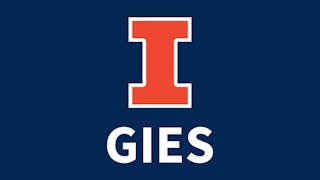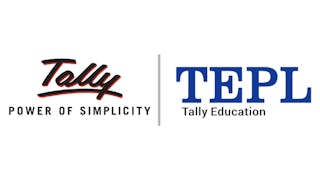Filter by
SubjectRequired
LanguageRequired
The language used throughout the course, in both instruction and assessments.
Learning ProductRequired
LevelRequired
DurationRequired
SkillsRequired
SubtitlesRequired
EducatorRequired
Explore the Cost Accounting Course Catalog
 Status: Free
Status: FreeCoursera Project Network
Skills you'll gain: Financial Statements, Microsoft Excel, Excel Formulas, Balance Sheet, Financial Data, Bookkeeping, Data Entry, Financial Reporting, Financial Accounting, Profit and Loss (P&L) Management
 Status: Free Trial
Status: Free TrialSkills you'll gain: Reconciliation, Financial Statements, Financial Statement Analysis, Inventory Accounting, Payroll, Bookkeeping, QuickBooks (Accounting Software), Payroll Administration, Inventory Control, Payroll Processing, Income Statement, Balance Sheet, Depreciation, Fixed Asset, Payroll Tax, Property Accounting, Financial Analysis, Sales Tax, Ledgers (Accounting), Accounting
 Status: Free Trial
Status: Free TrialRice University
Skills you'll gain: Capital Budgeting, Cash Flows, Financial Statements, Microsoft Excel, Descriptive Statistics, Financial Accounting, Business Analytics, Box Plots, Probability Distribution, Financial Analysis, Finance, Data Visualization, Probability, Statistics, Business Valuation, Financial Statement Analysis, Business Mathematics, Accounting, Return On Investment, General Accounting

Coursera Instructor Network
Skills you'll gain: Reconciliation, Accounting Records, Bookkeeping, Financial Reporting, Accounting, Financial Data, Compliance Management, Financial Statements, Internal Communications, Verbal Communication Skills, Automation
 Status: Free Trial
Status: Free TrialUniversity of Illinois Urbana-Champaign
Skills you'll gain: Balance Sheet, Financial Statements, Financial Statement Analysis, Financial Accounting, Accounting, Financial Reporting, Generally Accepted Accounting Principles (GAAP), Asset Management

Tally Education and Distribution Services Private Limited
Skills you'll gain: Accounts Payable and Receivable, Accounting Software, Ledgers (Accounting), Accounting, Financial Accounting, Sales Tax, Financial Statements, International Finance, Invoicing, Inventory Management System, Cash Handling, Tax Compliance, Reconciliation, Payment Systems, Banking
 Status: Free Trial
Status: Free TrialRice University
Skills you'll gain: Financial Statements, Financial Accounting, Cash Flows, Financial Statement Analysis, Accounting, General Accounting, Accruals, Balance Sheet, Income Statement, Bookkeeping, Accrual Accounting, Equities, Transaction Processing

University of Lausanne
Skills you'll gain: Mergers & Acquisitions, Equities, Tax, Accounting, Accounts Receivable, Securities (Finance), Financial Market, Inventory Accounting, Asset Management, Financial Accounting, Depreciation, Corporate Finance, Profit and Loss (P&L) Management, Balance Sheet, Financial Statements, Financial Reporting, Revenue Recognition, Cash Flows

Duke University
Skills you'll gain: Market Dynamics, Energy and Utilities, Operating Cost, Transportation Operations, Production Process, Supply Chain, Market Data, Market Trend, Cost Estimation, Global Marketing, Market Analysis, International Finance, Natural Resource Management
 Status: Free Trial
Status: Free TrialUniversity of Illinois Urbana-Champaign
Skills you'll gain: Management Accounting, Performance Measurement, Cost Accounting, Variance Analysis, Budgeting, Accounting, Capital Budgeting, Organizational Strategy, Key Performance Indicators (KPIs), Financial Analysis, Financial Statements, Return On Investment, Organizational Structure, Decision Making
 Status: Free Trial
Status: Free TrialUniversity of Pennsylvania
Skills you'll gain: Financial Data, Financial Analysis, Financial Statement Analysis, Financial Forecasting, Business Analytics, Predictive Analytics, Analytics, Forecasting, Financial Statements, Accounting, Business Metrics, Performance Analysis, Anomaly Detection, Return On Investment, Key Performance Indicators (KPIs), Business Strategy
 Status: Free Trial
Status: Free TrialUniversity of Illinois Urbana-Champaign
Skills you'll gain: Management Accounting, Income Statement, Financial Statements, Performance Measurement, Balance Sheet, Organizational Strategy, Financial Statement Analysis, Capacity Management, Cost Accounting, Cost Control, Cash Flows, Financial Accounting, Financial Reporting, Financial Analysis, Accounting, Budget Management, Business Metrics, Operational Analysis, Product Management, Business Strategy
In summary, here are 10 of our most popular cost accounting courses
- Create a Financial Statement using Microsoft Excel: Coursera Project Network
- Intuit Academy Bookkeeping: Intuit
- Business Finance and Data Analysis Fundamentals: Rice University
- Precision Bookkeeping: Records, Reconciliation, Reporting: Coursera Instructor Network
- Understanding Financial Statements: Company Position: University of Illinois Urbana-Champaign
- Financial Business Accounting and MIS Reports : Tally Education and Distribution Services Private Limited
- Accounting for Non-Finance Professionals: Rice University
- Accounting 2: University of Lausanne
- Oil & Gas Industry Operations and Markets : Duke University
- Managerial Accounting: Tools for Facilitating and Guiding Business Decisions: University of Illinois Urbana-Champaign










